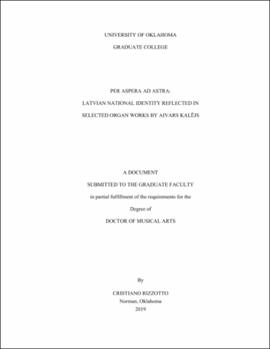| dc.contributor.advisor | Schwandt, John | |
| dc.contributor.author | Rizzotto Vidal Pessôa, Cristiano | |
| dc.date.accessioned | 2019-05-21T14:50:32Z | |
| dc.date.available | 2019-05-21T14:50:32Z | |
| dc.date.issued | 2019-05 | |
| dc.identifier.uri | https://hdl.handle.net/11244/319757 | |
| dc.description.abstract | The scope of this dissertation is to provide an overview of the fundamental importance of music in the formation of the national identity of the Latvian people and how music has helped them remain and overcome extreme adversities as a nonviolent gentle nation in the Herderian sense, and how the peaceful and resilient spirit it helped create was fundamental to the restoration of independence after decades of Soviet occupation; to provide a summary of the history and literature of the pipe organ in Latvia within the wider cultural and historical context of that country; and to present the organist and composer Aivars Kalējs as a worthy representative of the values and spirit of the Latvian heritage. The analysis of three of his most significant organ compositions demonstrates how the composer’s creative process relates back to the Latvian archetypal worldview and cultural heritage: Per aspera ad astra (1989), Via dolorosa (1992), and Solitudinem faciunt (2016). | en_US |
| dc.language | en | en_US |
| dc.subject | Music. | en_US |
| dc.subject | Latvia | en_US |
| dc.subject | Pipe Organ | en_US |
| dc.subject | National Identity | en_US |
| dc.title | PER ASPERA AD ASTRA: LATVIAN NATIONAL IDENTITY REFLECTED IN SELECTED ORGAN WORKS BY AIVARS KALĒJS | en_US |
| dc.contributor.committeeMember | Spritzer, Damin | |
| dc.contributor.committeeMember | Riddick, Frank | |
| dc.contributor.committeeMember | Enrico, Eugene | |
| dc.contributor.committeeMember | Ward, Janet | |
| dc.date.manuscript | 2019-05 | |
| dc.thesis.degree | D.M.A. | en_US |
| ou.group | Weitzenhoffer Family College of Fine Arts::School of Music | en_US |
